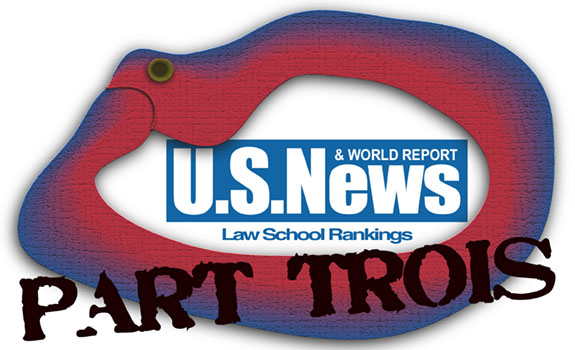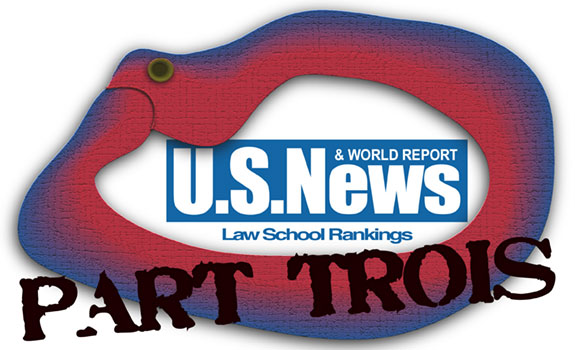Why U.S. News Law School Rankings are Lame: Part Trois
- by
- Jul 08, 2009
- Law School, Law School Rankings
- Reviewed by: Matt Riley


I’m tired of talking about this, so I can only imagine how tired you must be of hearing about it.
In my first post on this subject I argued that the USNWR rankings use LSAT scores in a way that is inappropriately self-reinforcing. In my second post, I argued that the use of lawyers’ and judges’ opinions in the rankings was inappropriate for similar reasons. By the end, I’d concluded that the USNWR rankings were performative, not merely descriptive, in that they heavily influence both law school admissions patterns and hiring practices which are the phenomena they’re purporting to track.
Before we finally put this issue to rest, I thought we should address the appropriate reaction for law school applicants who were persuaded by these arguments. That would be the interesting part, right? (assuming there was one.)
If you now agree that the USNWR rankings of law schools are a bit sketchy, should you then willfully blind yourself to them? If you do use them in making your decisions, aren’t you simply contributing to the ongoing distortion? Doesn’t this become your fault? Isn’t this kind of like the problems associated with global warming?
Should you be short on time, the answers to the questions above are (in order): No., Of course not., Are you kidding?, and Put down the bong and stop talking, please.
In a more nearly perfect world, the USNWR rankings wouldn’t themselves alter the subject of their study. But they do, and this is the world in which you find yourself. So the situation is this: there are these flawed rankings that are nevertheless so influential that both people competing with you and the people judging the competition are heavily swayed by them. Should you ignore them?
Even if you believe that the USNWR rankings don’t begin to measure the relative quality of law schools, the fact that they are the basis for future employment decisions has to be significant for you. Likewise, the fact that almost all other applicants are looking at these rankings should weigh on you as well. Not doing so would put you at a significant competitive disadvantage in a job market that is already tight.
You could always go to a lower-ranked law school in protest of the USNWR rankings, but that would be wholly inefficacious and self-destructive. A more effective solution would require the cooperation of other law school applicants and hiring partners as well. I’m expecting that to happen right after the World Court issues a global dictum on the subject.
What makes a ranking system significant is not its integrity, but the fact that most lawyers and law students utilize it. Before we worry about how to construct a better ranking system, we’d need to find a way to assure that a substantial percentage of people used it. Otherwise, we’d just be building castles in the sky.
So, after all this hullabaloo, you can still look at USNWR rankings and use them to chart your future. Just don’t make the mistake of believing that they actually measure the quality of law schools, and don’t ever look at someone from a lower-ranked school and think that you got the better legal education (at least solely on the basis of the USNWR rankings.)
Article by Trent Teti of Blueprint LSAT Preparation.
Search the Blog

Free LSAT Practice Account
Sign up for a free Blueprint LSAT account and get access to a free trial of the Self-Paced Course and a free practice LSAT with a detailed score report, mind-blowing analytics, and explanatory videos.
Learn More
Popular Posts
-
logic games Game Over: LSAC Says Farewell to Logic Games
-
General LSAT Advice How to Get a 180 on the LSAT
-
Entertainment Revisiting Elle's LSAT Journey from Legally Blonde








